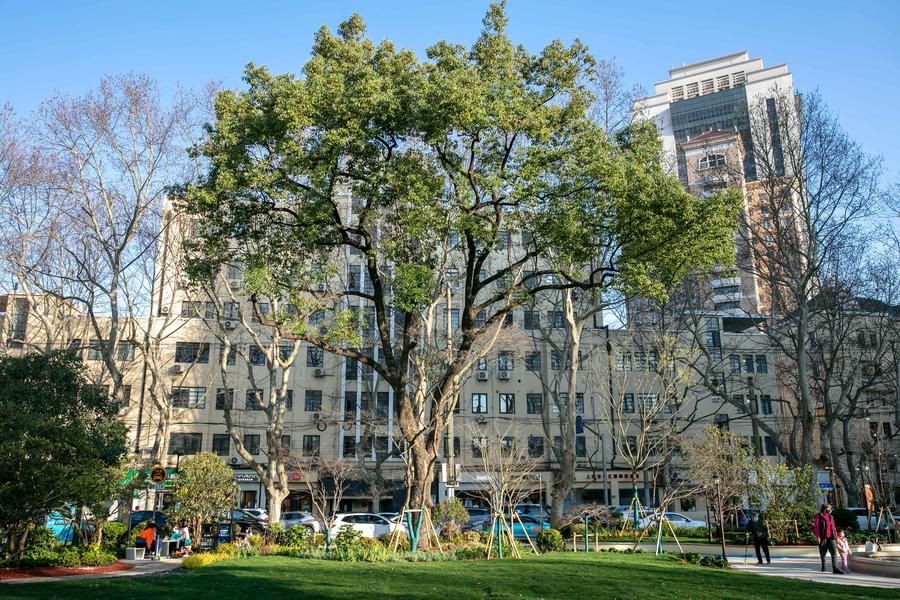This photo taken on March 14, 2023 shows a view of a pocket park in Xuhui District of Shanghai, east China. [Photo/Xinhua]
Shanghai, a
Greentown China Holdings Ltd., a Hong Kong-listed developer, made the record bid on Wednesday, beating out six contenders with an average cost exceeding 130,000 yuan (about 18,195 U.S. dollars) per square meter in a public land auction.
Against the backdrop of a sluggish property market, the 16,700-square-meter premium plot, located in a core riverside area of downtown Shanghai, became a new "land king," and the most expensive residential land ever sold on the Chinese mainland, by shattering an eight-year-old record of approximately 100,218 yuan per square meter.
Initially acquired by Xiaomi, a renowned Chinese tech firm, for commercial office use at a price of 1.55 billion yuan in 2021, the plot was later reclassified as residential and relisted with a starting price of nearly 3.7 billion yuan.
Notably, the starting average floor price reached 100,805 yuan per square meter, which had already surpassed the previous national land price record.
In addition, the plot's appeal to developers was heightened by the absence of requirements for medium- and small-sized unit proportions or a minimum allocation of affordable housing.
The sale was conducted through a combined bidding process with a maximum price cap of about 4.8 billion yuan. The plot reached the maximum price, which meant that the winning bidder had to be determined by a lottery.
Many industry insiders believe that the removal of the 10-percent premium rate limit in Shanghai's land auctions, the plot's prime location, and the country's various measures aimed at stabilizing the property market, had all played a significant role in the creation of this new "land king," which also signals strengthened market confidence.
According to real estate agency Centaline Property, the area surrounding this site has always been a prime hotspot for high-end real estate. As the area's commercial facilities continue to improve, the comfort and convenience of living there have significantly increased. Its reputation has contributed to nearly all residential real estate projects in the area selling out quickly.
Lu Wenxi, a market analyst with the real estate agency, said there were 72 intense bidding rounds before the auction proceeded to a lottery phase, reflecting a notable rebound in market confidence. "Significantly, private enterprises, which had almost lost their investment capacity in recent years, were active in this bidding process."
On the same day, Greentown also secured another urban plot in Shanghai, demonstrating a vigorous strategy to bolster its portfolio, while further validating Lu's assessment.
In a conversation with Xinhua, Liu Zhonghui, deputy general manager of Greentown China's brand management department, expressed the developer's confidence in the country's property market, particularly in China's first-tier cities.
"In an uncertain market environment, Greentown remains committed to its investment strategy of focusing on core plots in key cities," Liu added. "We are dedicated not only to property sales but also to closely monitoring premium land opportunities in various regions."
Since 2024, Greentown has expanded its portfolio in key areas of Chinese cities such as Shanghai, Hangzhou, Suzhou and Xi'an.
According to Yan Yuejin, deputy director at E-house China R&D Institute, the emergence of a new land price record, especially under current market conditions, sends a positive signal.
"This underscores the growing interest among land buyers in premium cities and markets and plays a positive role in bolstering confidence in the real estate sector," Yan said.
He also emphasized that new housing within Shanghai's central districts remains in strong demand, with market purchasing power surpassing expectations.
However, this latest land auction also saw a notable divergence in market activity, with only two of the five plots on offer achieving premium prices, showcasing the trend of polarization in the property market.
Ding Zuyu, president of the property research institution CRIC, said that the land market remains highly segmented, with only key plots attracting significant investment. However, high-priced land can also encourage developers to focus on quality.
China has recently rolled out a series of policies to stabilize the property sector and boost market confidence.
Moreover, local state-owned enterprises are encouraged to buy homes for affordable housing initiatives, while a whitelist mechanism seeks to help cash-strapped developers access credit, complete housing projects and deliver homes to buyers.
Meanwhile, the resolution adopted at the third plenary session of the 20th Communist Party of China Central Committee also provides a strong impetus and institutional guarantee.
According to the resolution, municipal governments will be given greater decision-making powers to regulate the real estate market, and based on local conditions, some cities will be permitted to abolish or reduce restrictions on housing purchases and to scrap relevant standards for ordinary and non-ordinary housing.
Pu Zhan, deputy director of the policy research center under the Ministry of Housing and Urban-Rural Development, said various regions have adapted and optimized real estate policies according to local conditions.
As a result, policy effects are gradually being realized, market activity has increased, and positive changes are emerging in the real estate sector, Pu added.





